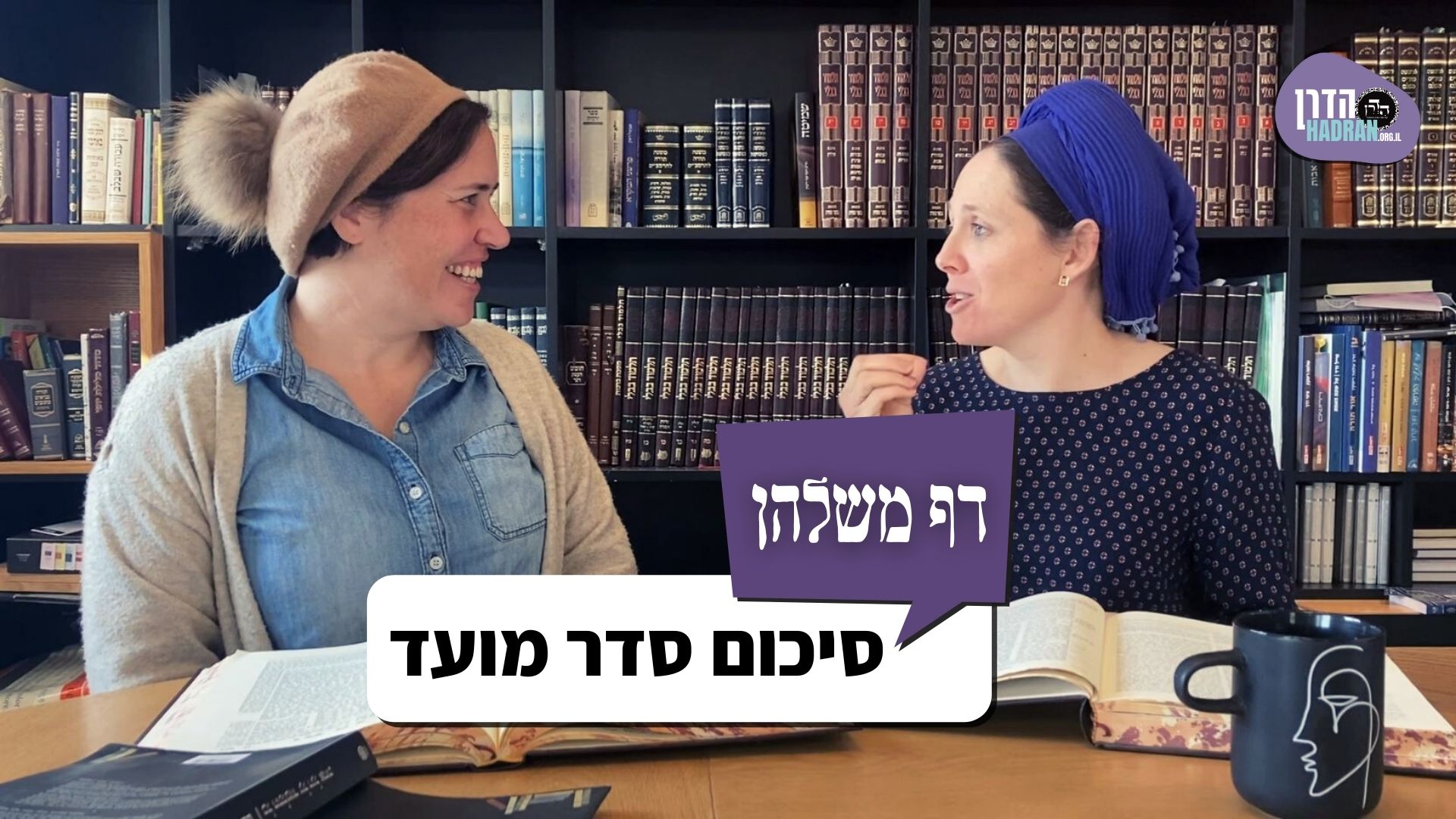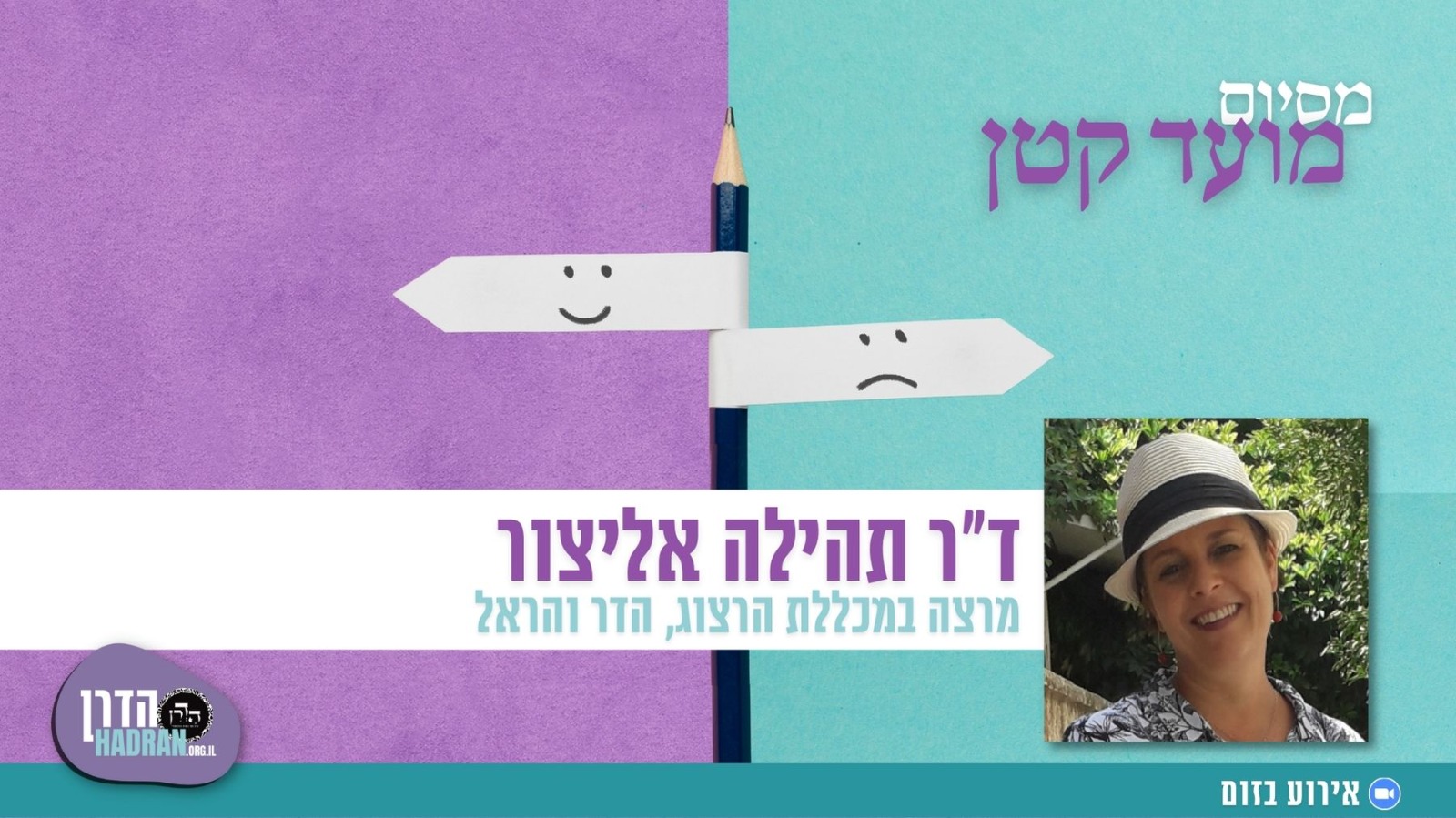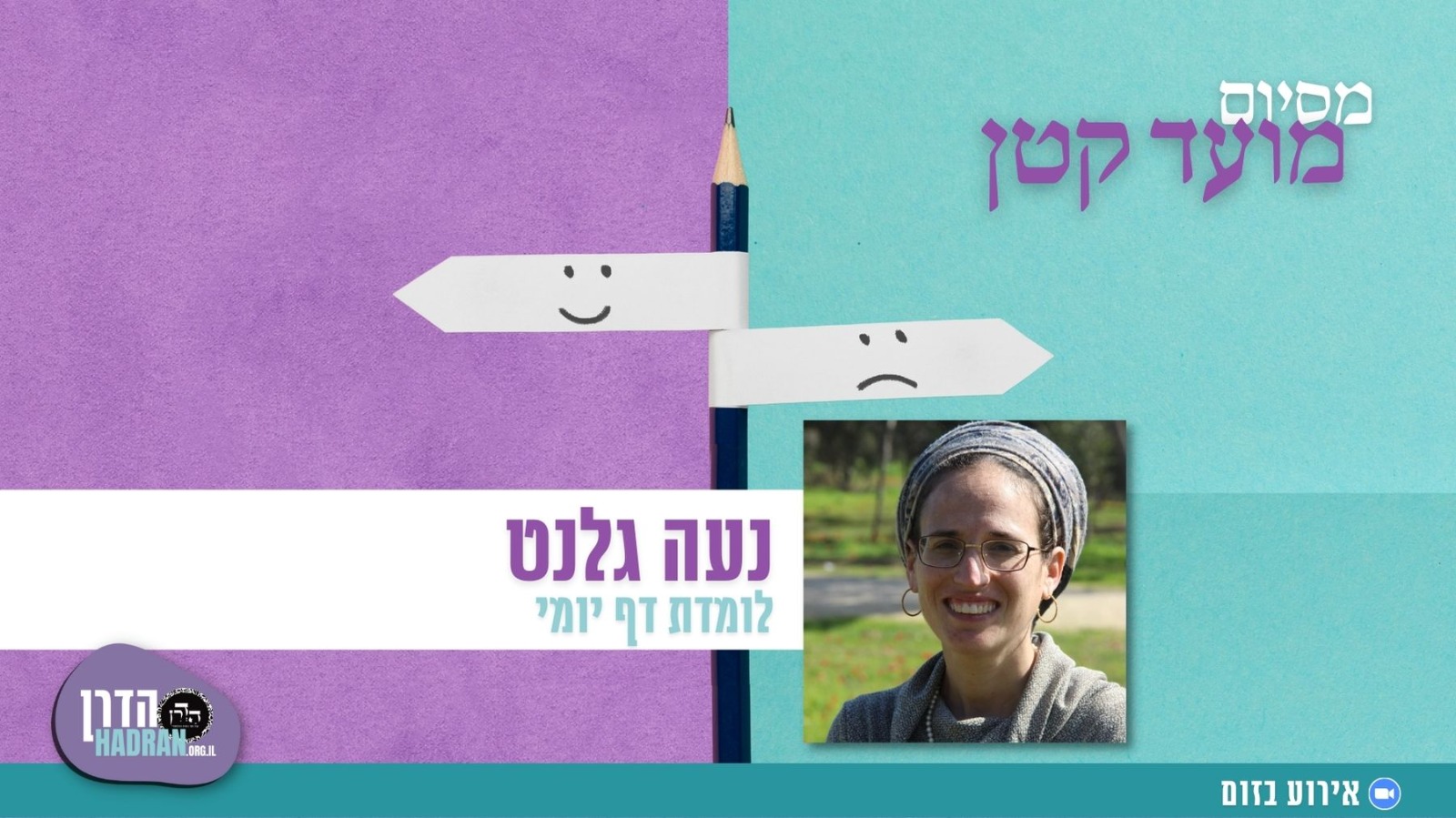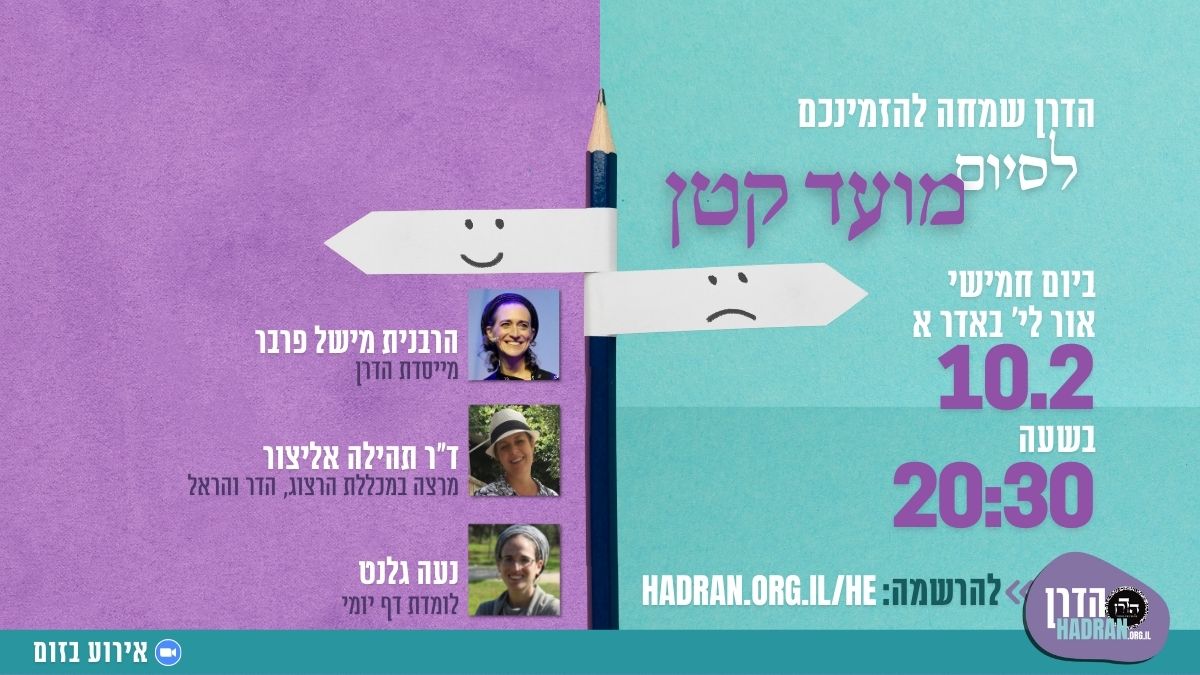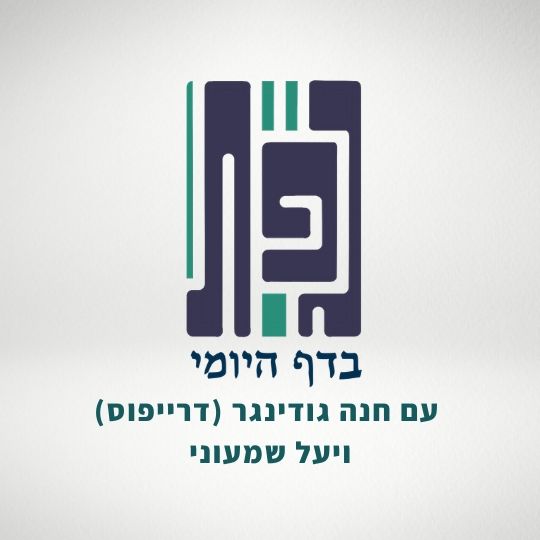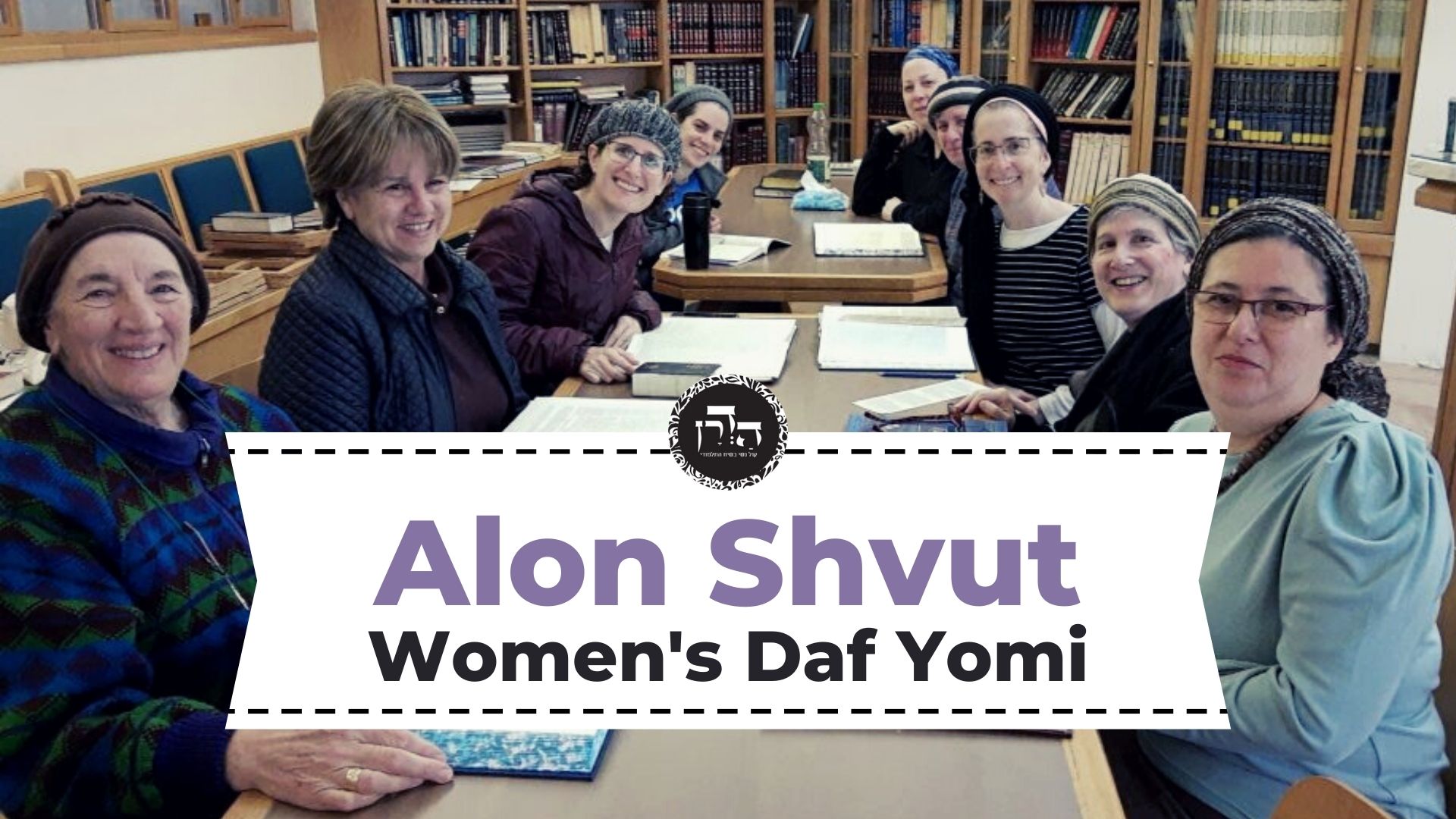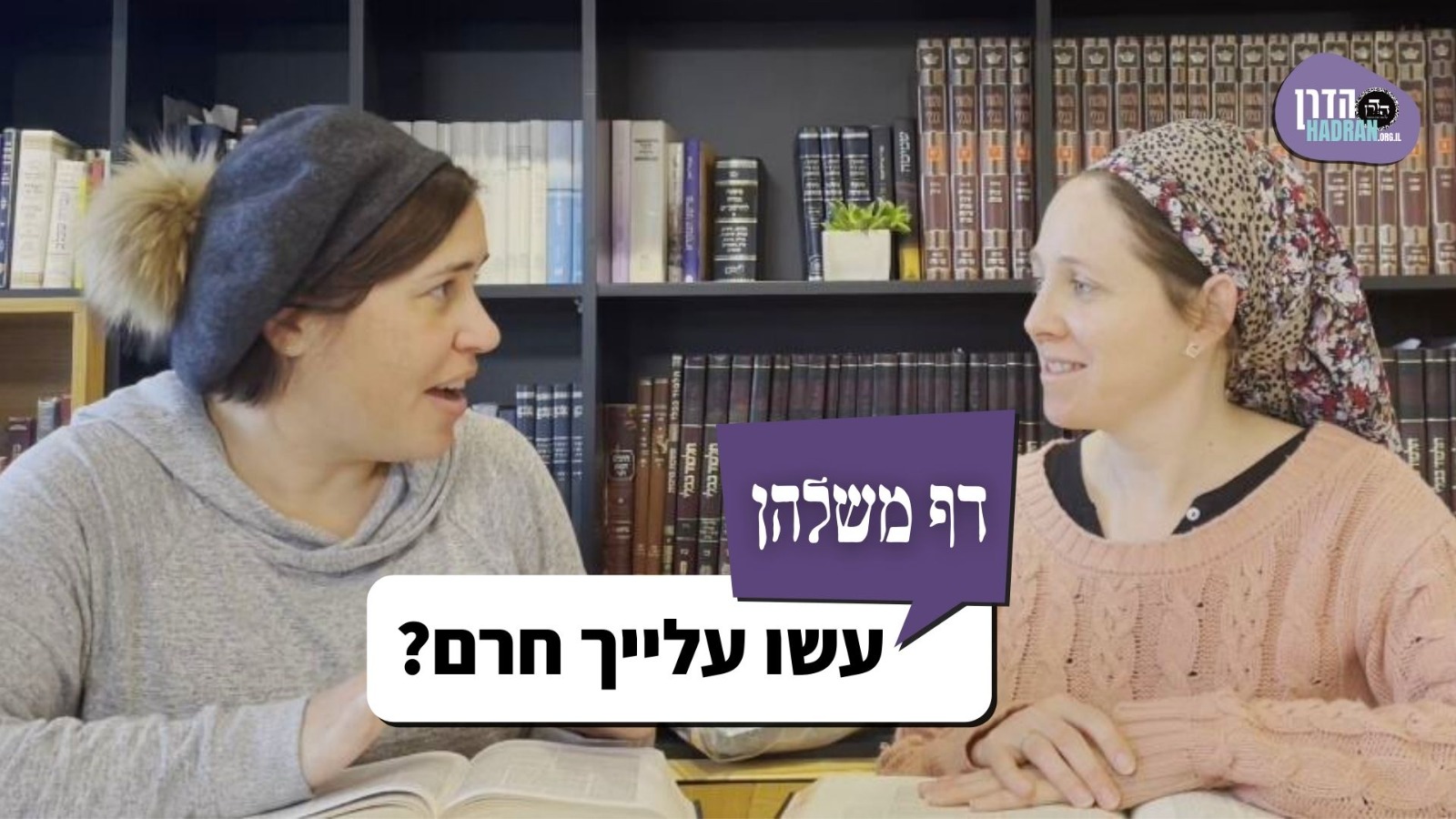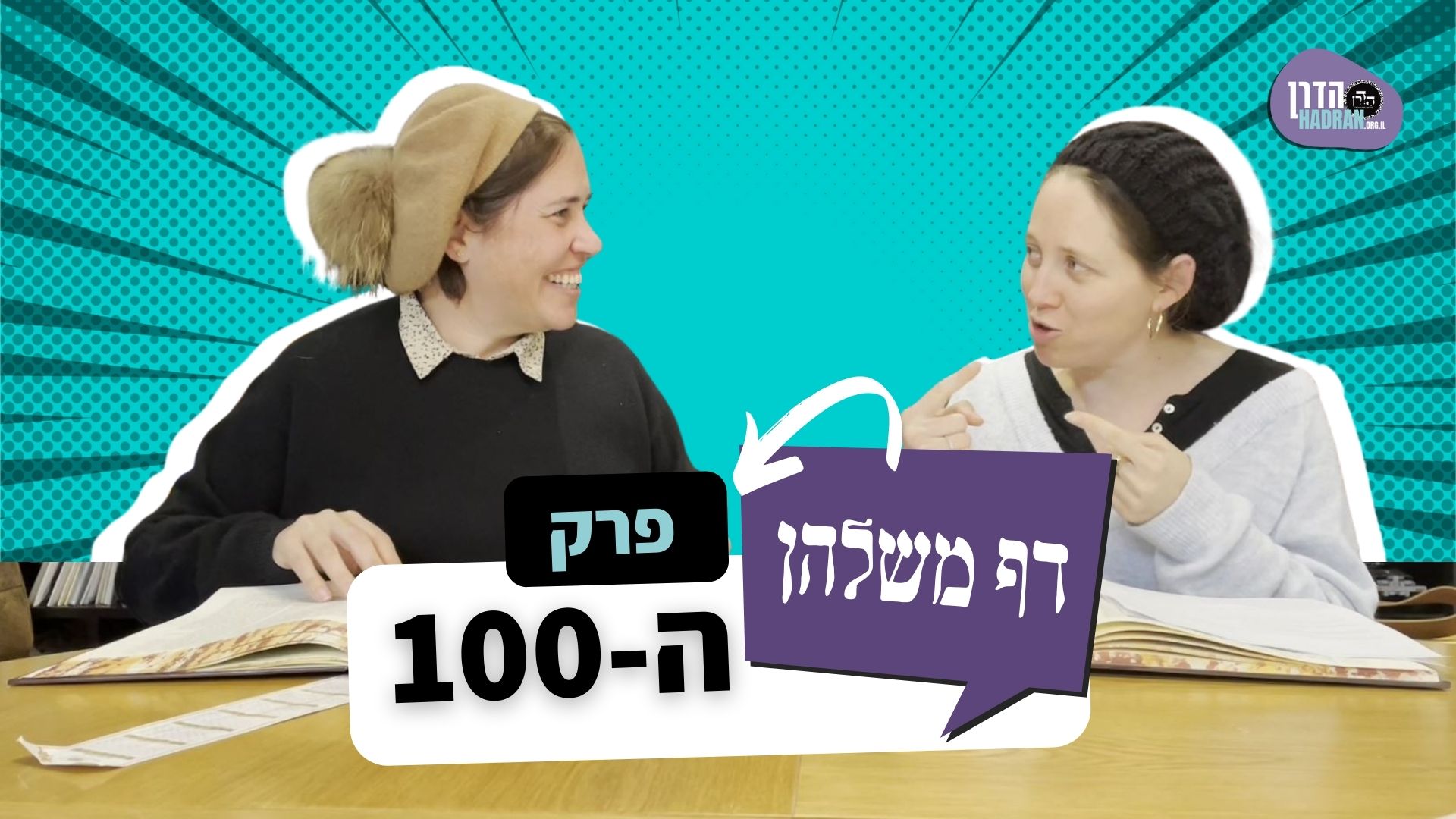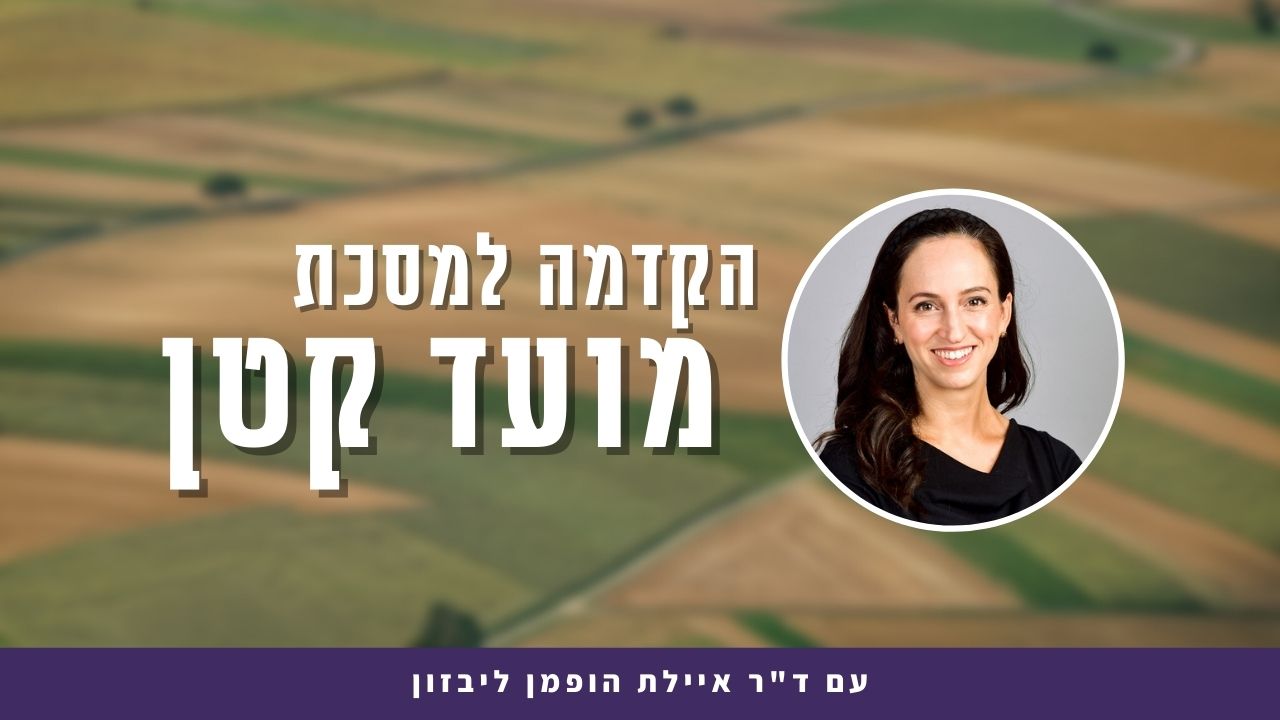מועד קטן כא
אֶלָּא מֵעַתָּה: ״וְעָמַד וְאָמַר לֹא חָפַצְתִּי לְקַחְתָּהּ״, הָכָא נָמֵי? וְהָא תַּנְיָא: בֵּין יוֹשֵׁב בֵּין עוֹמֵד בֵּין מוּטֶּה!
Rav Ashi challenged him: However, if that is so, one should be required to stand while performing the ritual through which the brother-in-law frees the yevama of her levirate bonds [ḥalitza], as the verse states: “And if he stands and he says: I do not wish to take her” (Deuteronomy 25:8). Here must he also stand for the ceremony? But isn’t it taught in a baraita that ḥalitza may be performed whether the man is sitting, or standing, or reclining?
אֲמַר לֵיהּ: הָתָם לָא כְּתִיב ״וְיַעֲמֹד וְיֹאמַר״, הָכָא כְּתִיב ״וַיָּקׇם וַיִּקְרַע״.
He said to him: There, in the case of ḥalitza, it is not written: And he will stand and he will say, which would imply an obligation to stand; whereas here, in the case of rending, it is written: “Then Job arose, and rent his coat” (Job 1:20).
אָמַר רָמֵי בַּר חָמָא: מִנַּיִן לִקְרִיעָה שֶׁהִיא מְעוּמָּד, שֶׁנֶּאֱמַר: ״וַיָּקׇם אִיּוֹב וַיִּקְרַע״. דִּלְמָא מִילְּתָא יַתִּירְתָּא הוּא דַּעֲבַד? דְּאִי לָא תֵּימָא הָכִי — ״וַיָּגׇז אֶת רֹאשׁוֹ״, הָכִי נָמֵי?
Rami bar Ḥama said: From where is it derived that rending must be performed while standing? As it is stated: “Then Job arose, and rent his coat” (Job 1:20). The Gemara asks: Perhaps he did something extra beyond what is required, and actually there is no obligation to stand; as, if you do not say that he did more than what was required of him, then how do you explain the continuation of the verse: “And he shaved his head” (Job 1:20)? Is every mourner required to act in this manner also and shave his head?
אֶלָּא מֵהָכָא: ״וַיָּקָם הַמֶּלֶךְ וַיִּקְרַע אֶת בְּגָדָיו״. וְדִלְמָא מִילְּתָא יַתִּירְתָּא עָבֵיד? דְּאִי לָא תֵּימָא הָכִי — ״וַיִּשְׁכַּב אָרְצָה״, הָכִי נָמֵי?
The Gemara concludes: Rather, this source must be rejected, and instead the halakha is derived from here, the verse that describes David’s mourning over his son: “Then the king arose, and rent his garments” (II Samuel 13:31). The Gemara asks: But perhaps he too did something extra beyond what is required, and he was not actually obligated to stand; as, if you do not say that he did more than what was required of him, then how do you explain the continuation of the verse: “And he lay on the earth” (II Samuel 13:31)? Is every mourner required to act in this manner also?
וְהָתַנְיָא: יָשַׁב עַל גַּבֵּי מִטָּה, עַל גַּבֵּי כִּסֵּא, עַל גַּבֵּי אוּדְיָינִי גְּדוֹלָה, עַל גַּבֵּי קַרְקַע — מִכּוּלָּן לֹא יָצָא יְדֵי חוֹבָתוֹ. וְאָמַר רַבִּי יוֹחָנָן: שֶׁלֹּא קִיֵּים כְּפִיַּית הַמִּטָּה!
But isn’t it taught in a baraita: If a mourner sat on a bed, on a chair, on a large mortar [udyanei], or on the ground, he does not fulfill his obligation through any of them. And Rabbi Yoḥanan said: This is because he did not fulfill his obligation to overturn his bed, even if he lay on the ground. This indicates that there is no requirement whatsoever to lie on the ground.
אֲמַר לֵיהּ: כְּעֵין אַרְצָה.
Ameimar said to Rav Ashi: The verse does not mean that David actually lay on the ground. Rather, it was as if he were on the ground, since he overturned his bed and brought it closer to the ground. If this is the case, then Ameimar acted correctly, and a mourner should rend his garments while standing.
תָּנוּ רַבָּנַן, וְאֵלּוּ דְּבָרִים שֶׁאָבֵל אָסוּר בָּהֶן: אָסוּר בִּמְלָאכָה וּבִרְחִיצָה וּבְסִיכָה וּבְתַשְׁמִישׁ הַמִּטָּה וּבִנְעִילַת הַסַּנְדָּל. וְאָסוּר לִקְרוֹת בְּתוֹרָה וּבַנְּבִיאִים וּבַכְּתוּבִים, וְלִשְׁנוֹת בַּמִּשְׁנָה, בַּמִּדְרָשׁ וּבָהֲלָכוֹת, וּבַתַּלְמוּד וּבָאַגָּדוֹת. וְאִם הָיוּ רַבִּים צְרִיכִין לוֹ — אֵינוֹ נִמְנָע. וּמַעֲשֶׂה וּמֵת בְּנוֹ שֶׁל רַבִּי יוֹסֵי בְּצִיפּוֹרִי, וְנִכְנַס לְבֵית הַמִּדְרָשׁ, וְדָרַשׁ כׇּל הַיּוֹם כּוּלּוֹ.
§ The Sages taught: These are the activities that a mourner is prohibited from engaging in: He is prohibited from working, and from bathing, and from anointing himself with oil, and from engaging in sexual relations, and from wearing shoes. And he is prohibited from reading in the Torah, and in the Prophets, and in the Writings, and from studying in the Mishna, in the midrash, and in the halakhot, and in the Talmud, and in the aggadot. But if the public needs him to teach them these things, he need not refrain from doing so. There was an incident that the son of Rabbi Yosei died in Tzippori, and Rabbi Yosei entered the study hall and expounded there for the entire day.
רַבָּה בַּר בַּר חָנָה אִיתְּרַעָא בֵּיהּ מִילְּתָא, סָבַר דְּלָא לְמִיפַּק לְפִירְקָא. אֲמַר לֵיהּ רַבִּי חֲנִינָא: אִם הָיוּ רַבִּים צְרִיכִין לוֹ — אֵינוֹ נִמְנָע. סְבַר לְאוֹקוֹמֵי אָמוֹרָא עֲלֵיהּ. אֲמַר לֵיהּ רַב: תַּנְיָא, וּבִלְבַד שֶׁלֹּא יַעֲמִיד תּוּרְגְּמָן.
It was related that a calamity, i.e., a death in the family, once befell Rabba bar bar Ḥana, and he thought not to go out to deliver his exposition. Rabbi Ḥanina said to him: Is it not taught that if the public needs him to teach them these things, one need not refrain from doing so? He then thought to place an interpreter alongside him, who would sound his words to the public, as was normally done for such an exposition. Rav said to him: It is taught in a baraita similarly: Provided that he does not place the disseminator alongside him.
וְאֶלָּא הֵיכִי עָבֵיד? כִּי הָא דְּתַנְיָא: מַעֲשֶׂה וּמֵת בְּנוֹ שֶׁל רַבִּי יְהוּדָה בַּר אִילְעַאי, וְנִכְנַס לְבֵית הַמִּדְרָשׁ. וְנִכְנַס רַבִּי חֲנַנְיָה בֶּן עֲקַבְיָא וְיָשַׁב בְּצִדּוֹ, וְלָחַשׁ הוּא לְרַבִּי חֲנַנְיָה בֶּן עֲקַבְיָא, וְרַבִּי חֲנַנְיָה בֶּן עֲקַבְיָא לְתוּרְגְּמָן, וְתוּרְגְּמָן הִשְׁמִיעַ לָרַבִּים.
The Gemara asks: But how, then, should he act so that he can be heard? The Gemara answers: It is like that which is taught in a baraita: There was an incident and the son of Rabbi Yehuda bar Ilai died, and Rabbi Yehuda entered the study hall. And Rabbi Ḥananya ben Akavya entered after him and sat by his side. Rabbi Yehuda bar Ilai then whispered his lecture to Rabbi Ḥananya ben Akavya, and Rabbi Ḥananya ben Akavya whispered it to the disseminator, and the disseminator sounded to the public what had been told to him. In this way, it became known that Rabbi Yehuda bar Ilai was in mourning.
תָּנוּ רַבָּנַן: אָבֵל, שְׁלֹשָׁה יָמִים הָרִאשׁוֹנִים — אָסוּר לְהַנִּיחַ תְּפִילִּין, מִשְּׁלִישִׁי וְאֵילָךְ, וּשְׁלִישִׁי בַּכְּלָל — מוּתָּר לְהַנִּיחַ תְּפִילִּין. וְאִם בָּאוּ פָּנִים חֲדָשׁוֹת — אֵינוֹ חוֹלֵץ, דִּבְרֵי רַבִּי אֱלִיעֶזֶר. רַבִּי יְהוֹשֻׁעַ אוֹמֵר: אָבֵל, שְׁנֵי יָמִים הָרִאשׁוֹנִים אָסוּר לְהַנִּיחַ תְּפִילִּין. מִשֵּׁנִי, וְשֵׁנִי בַּכְּלָל — מוּתָּר לְהַנִּיחַ תְּפִילִּין, וְאִם בָּאוּ פָּנִים חֲדָשׁוֹת — חוֹלֵץ.
§ The Sages taught the following baraita: For the first three days, a mourner is prohibited from donning phylacteries. From the third day and on, and including the third day, he is permitted to don phylacteries. And if new faces, i.e., people who had not yet come to console him, come, he need not remove them, although these people may falsely conclude that he had also donned phylacteries during the first two days of his mourning; this is the statement of Rabbi Eliezer. Rabbi Yehoshua says: For the first two days, a mourner is prohibited from donning phylacteries. From the second day, and including the second day, he is permitted to wear phylacteries. But if new faces come in to console him, he must remove his phylacteries.
אָמַר רַב מַתְנָה: מַאי טַעְמָא דְּרַבִּי אֱלִיעֶזֶר, דִּכְתִיב: ״וַיִּתְּמוּ יְמֵי בְכִי אֵבֶל מֹשֶׁה״. אָמַר רַב עֵינָא: מַאי טַעְמָא דְּרַבִּי יְהוֹשֻׁעַ, דִּכְתִיב: ״וְאַחֲרִיתָהּ כְּיוֹם מָר״.
Rav Mattana said: What is the reason of Rabbi Eliezer? As it is written: “And the days of weeping and mourning for Moses ended” (Deuteronomy 34:8). The plural term “days” implies a minimum of two, and it indicates that the main portion of the mourning period is the first two full days. Rav Eina said: What is the reason of Rabbi Yehoshua? As it is written: “And I will make it as the mourning for an only son, and its end as a bitter day” (Amos 8:10), i.e., a single “day.”
וְרַבִּי יְהוֹשֻׁעַ נָמֵי, הָא כְּתִיב: ״וַיִּתְּמוּ יְמֵי וְגוֹ׳״! אָמַר לָךְ: שָׁאנֵי מֹשֶׁה, דְּתַקִּיף אֶבְלֵיהּ. וְרַבִּי אֱלִיעֶזֶר נָמֵי, הָא כְּתִיב: ״וְאַחֲרִיתָהּ כְּיוֹם מָר״! עִיקַּר מְרִירָא חַד יוֹמָא הוּא.
The Gemara asks: But also for Rabbi Yehoshua, isn’t it written in the Torah: “And the days of weeping and mourning for Moses ended,” thereby implying that this period lasts for two days? The Gemara answers: He could have said to you that Moses was different, because the mourning for him was more intense, and the people mourned for him longer than usual. The Gemara asks: But also for Rabbi Eliezer, isn’t it written in the Torah: “And its end as a bitter day”? The Gemara answers: He could have said to you that the main bitterness is only one day, but the severity of the mourning lasts for two days.
אָמַר עוּלָּא: הֲלָכָה כְּרַבִּי אֱלִיעֶזֶר בַּחֲלִיצָה, וַהֲלָכָה כְּרַבִּי יְהוֹשֻׁעַ בְּהַנָּחָה.
Ulla said: The halakha is in accordance with the opinion of Rabbi Eliezer with regard to the removal of phylacteries. A mourner need not remove them when new people come in to console him. And the halakha is in accordance with the opinion of Rabbi Yehoshua with regard to the donning of phylacteries, and so a mourner may already don phylacteries on the second day.
אִיבַּעְיָא לְהוּ: בַּשֵּׁנִי לְעוּלָּא, חוֹלֵץ אוֹ אֵינוֹ חוֹלֵץ?
A dilemma was raised before the scholars: According to Ulla, who rules in accordance with Rabbi Yehoshua that a mourner may don phylacteries on his second day of mourning, is the mourner required to remove them if new people arrive on that day, or is he not required to remove them?
תָּא שְׁמַע, אָמַר עוּלָּא: חוֹלֵץ וּמַנִּיחַ אֲפִילּוּ מֵאָה פְּעָמִים. תַּנְיָא נָמֵי הָכִי, יְהוּדָה בֶּן תֵּימָא אוֹמֵר: חוֹלֵץ וּמַנִּיחַ אֲפִילּוּ מֵאָה פְּעָמִים.
The Gemara answers: Come and hear what Ulla said explicitly: One removes his phylacteries when new people come to console him, and he dons them again when they leave, even if he must don and remove them a hundred times. This is also taught in a baraita: Yehuda ben Teima says: He removes his phylacteries and dons them again, even if he must do so a hundred times.
רָבָא אָמַר: כֵּיוָן שֶׁהִנִּיחַ שׁוּב אֵינוֹ חוֹלֵץ. וְהָא רָבָא הוּא דְּאָמַר: הֲלָכָה כְּתַנָּא דִּידַן דְּאָמַר שְׁלֹשָׁה!
Rava said: Once he dons his phylacteries, he does not remove them again. The Gemara asks: But wasn’t it Rava himself who said: The halakha is in accordance with the opinion of the tanna of our mishna, who said that the most serious period of mourning is three days? How then does he rule in accordance with the baraita that a mourner may don phylacteries during these days?
מִצְוָה שָׁאנֵי.
The Gemara answers: A mitzva is different, and since it is a mitzva to put on phylacteries, the mourner is required to do so, even during the first three days.
תָּנוּ רַבָּנַן: אָבֵל, שְׁלֹשָׁה יָמִים הָרִאשׁוֹנִים אָסוּר בִּמְלָאכָה, וַאֲפִילּוּ עָנִי הַמִּתְפַּרְנֵס מִן הַצְּדָקָה. מִכָּאן וְאֵילָךְ — עוֹשֶׂה בְּצִינְעָא בְּתוֹךְ בֵּיתוֹ. וְהָאִשָּׁה טוֹוָה בַּפֶּלֶךְ בְּתוֹךְ בֵּיתָהּ.
§ The Sages taught the following baraita: During the first three days after his bereavement, a mourner is prohibited from working, even if he is a poor person who is supported by charity. From this point forward, he may do work privately in his own home if he needs to do so. And similarly a woman may spin thread on a spindle in her own home when she is mourning.
תָּנוּ רַבָּנַן: אָבֵל, שְׁלֹשָׁה יָמִים הָרִאשׁוֹנִים אֵינוֹ הוֹלֵךְ לְבֵית הָאֵבֶל, מִכָּאן וְאֵילָךְ הוֹלֵךְ, וְאֵינוֹ יוֹשֵׁב בִּמְקוֹם הַמְנַחֲמִין, אֶלָּא בִּמְקוֹם הַמִּתְנַחֲמִין.
The Sages taught in another baraita: A mourner during the first three days after his bereavement may not go to another mourner’s house to console him. From this point forward, he may go, but he may not sit among the consolers, but rather in the place of those being consoled, i.e., with the mourners in that house.
תָּנוּ רַבָּנַן: אָבֵל, שְׁלֹשָׁה יָמִים הָרִאשׁוֹנִים אָסוּר בִּשְׁאֵילַת שָׁלוֹם. מִשְּׁלֹשָׁה וְעַד שִׁבְעָה — מֵשִׁיב וְאֵינוֹ שׁוֹאֵל. מִכָּאן וְאֵילָךְ, שׁוֹאֵל וּמֵשִׁיב כְּדַרְכּוֹ.
§ The Sages taught in yet another baraita: A mourner, during the first three days after his bereavement, is prohibited from extending greetings to others. From the third day to the seventh day, he may respond when other people address him, but he may not extend greetings to them. From this point forward, he may extend greetings and respond in his usual manner.
שְׁלֹשָׁה יָמִים הָרִאשׁוֹנִים אָסוּר בִּשְׁאֵילַת שָׁלוֹם? וְהָתַנְיָא: מַעֲשֶׂה וּמֵתוּ בָּנָיו שֶׁל רַבִּי עֲקִיבָא, נִכְנְסוּ כׇּל יִשְׂרָאֵל וְהִסְפִּידוּם הֶסְפֵּד גָּדוֹל.
The Gemara asks: Is he really prohibited from extending greetings during the first three days of mourning? But isn’t it taught in a baraita: There was an incident and the sons of Rabbi Akiva died, and all the Jews entered to eulogize them with a great eulogy.
בִּשְׁעַת פְּטִירָתָן, עָמַד רַבִּי עֲקִיבָא עַל סַפְסָל גָּדוֹל וְאָמַר: אַחֵינוּ בֵּית יִשְׂרָאֵל שִׁמְעוּ! אֲפִילּוּ שְׁנֵי בָנִים חֲתָנִים — מְנוּחָם הוּא בִּשְׁבִיל כָּבוֹד שֶׁעֲשִׂיתֶם. וְאִם בִּשְׁבִיל עֲקִיבָא בָּאתֶם, הֲרֵי כַּמָּה עֲקִיבָא בַּשּׁוּק. אֶלָּא כָּךְ אֲמַרְתֶּם: תּוֹרַת אֱלֹהָיו בְּלִבּוֹ. וְכׇל שֶׁכֵּן שֶׁשְּׂכַרְכֶם כָּפוּל, לְכוּ לְבָתֵּיכֶם לְשָׁלוֹם!
When they were about to take leave, Rabbi Akiva stood on a large bench and said: Our brothers, the house of Israel, listen! Even had my two sons been bridegrooms, I would have been consoled on account of the honor you have shown them. If you came to console for the sake of Akiva, there are many Akivas in the marketplace whom the Jews do all not come to console. Rather, certainly this is what you said to yourselves: “The Torah of his God is in his heart” (Psalms 37:31), and you wished to show your respect for the Torah. All the more so is your reward doubled, for you have consoled mourners and shown respect for the Torah. Return now to your homes in peace. This indicates that a mourner may greet other people even on the first day of his mourning.
כְּבוֹד רַבִּים שָׁאנֵי.
The Gemara answers: Showing respect for the public is different. Rabbi Akiva was permitted to greet them to demonstrate courtesy and respect.
מִשְּׁלֹשָׁה וְעַד שִׁבְעָה — מֵשִׁיב וְאֵינוֹ שׁוֹאֵל, מִכָּאן וְאֵילָךְ, שׁוֹאֵל וּמֵשִׁיב כְּדַרְכּוֹ.
§ It was taught in the aforementioned baraita: From the third day to the seventh day, he may respond when other people address him, but he may not extend greetings to them. From this point forward, he may extend greetings and respond in his usual manner.
וּרְמִינְהוּ: הַמּוֹצֵא אֶת חֲבֵירוֹ אָבֵל, בְּתוֹךְ שְׁלֹשִׁים יוֹם — מְדַבֵּר עִמּוֹ תַּנְחוּמִין וְאֵינוֹ שׁוֹאֵל בִּשְׁלוֹמוֹ, לְאַחַר שְׁלֹשִׁים יוֹם — שׁוֹאֵל בִּשְׁלוֹמוֹ וְאֵינוֹ מְדַבֵּר עִמּוֹ תַּנְחוּמִין.
And the Gemara raises a contradiction from another baraita that states: One who finds another in mourning during the first thirty days of that person’s bereavement may still speak words of consolation to him, but he should not extend greetings toward him. If he finds him after thirty days, he may extend greetings toward him, but he should not speak words of consolation to him, so as not to remind him of his pain.
מֵתָה אִשְׁתּוֹ וְנָשָׂא אִשָּׁה אַחֶרֶת, אֵינוֹ רַשַּׁאי לִיכָּנֵס לְבֵיתוֹ לְדַבֵּר עִמּוֹ תַּנְחוּמִין. מְצָאוֹ בַּשּׁוּק — אוֹמֵר לוֹ בְּשָׂפָה רָפָה וּבְכוֹבֶד רֹאשׁ.
If it was the mourner’s wife who died and he married another woman within thirty days of his first wife’s death, one may not enter his house to speak words of consolation with him, so as not to offend his new wife. If, however, he finds him alone in the marketplace, he may speak to him with gentle words and in a serious manner. This indicates that the prohibition against extending greetings lasts for thirty days and not just seven.
אָמַר רַב אִידִי בַּר אָבִין: הוּא שׁוֹאֵל בִּשְׁלוֹם אֲחֵרִים — שֶׁאֲחֵרִים שְׁרוּיִין בְּשָׁלוֹם, אֲחֵרִים אֵין שׁוֹאֲלִין בִּשְׁלוֹמוֹ, שֶׁהוּא אֵינוֹ שָׁרוּי בְּשָׁלוֹם.
Rav Idi bar Avin said: The two baraitot refer to different situations: The first baraita is referring to the mourner himself, who may extend greetings [shalom] to others after the completion of his seven days of mourning, as the others are at peace [shalom]. The second baraita, which speaks of a prohibition that lasts thirty days, is referring to other people, who may not extend greetings to him, as he, the mourner, is not at peace.
וְהָא מִדְּקָתָנֵי מֵשִׁיב, מִכְּלָל דְּשָׁיְילִינַן לֵיהּ? דְּלָא יָדְעִי.
The Gemara challenges: But from the fact that it teaches in a baraita that after the third day of his bereavement, the mourner may respond when other people address him, by inference others may extend greetings to him. The Gemara answers: This is referring to a case where people did not know that he was in mourning and unknowingly extended greetings to him.
אִי הָכִי, הָתָם נָמֵי! הָתָם — מוֹדַע לְהוּ וְלָא מַהְדַּר לְהוּ, הָכָא — לָא צָרִיךְ לְאוֹדוֹעִינְהוּ.
The Gemara asks: If so, if the baraita speaks of a case where the people who greeted him were unaware that he was in mourning, then there also, during the first three days of his bereavement, he should be permitted to respond when other people address him. The Gemara answers: There, during the first three days, he must inform them that he is in mourning and not respond to their greetings. Here, after the first three days, he need not inform them about his bereavement, but rather he may respond to their greetings.
וּרְמִינְהוּ: הַמּוֹצֵא אֶת חֲבֵרוֹ אָבֵל, בְּתוֹךְ שְׁנֵים עָשָׂר חֹדֶשׁ — מְדַבֵּר עִמּוֹ תַּנְחוּמִין, וְאֵינוֹ שׁוֹאֵל בִּשְׁלוֹמוֹ. לְאַחַר שְׁנֵים עָשָׂר חֹדֶשׁ — שׁוֹאֵל בִּשְׁלוֹמוֹ, וְאֵינוֹ מְדַבֵּר עִמּוֹ תַּנְחוּמִין, אֲבָל מְדַבֵּר עִמּוֹ מִן הַצַּד.
And the Gemara raises a contradiction from another baraita that states: One who finds another in mourning during his twelve months of bereavement may still speak words of consolation to him, but he should not extend greetings toward him. If he finds him after twelve months, he may extend greetings toward him, and he should not speak words of consolation to him. He may, however, speak to him indirectly, i.e., he may say to him: May you be consoled, without mentioning the name of the deceased.
אָמַר רַבִּי מֵאִיר: הַמּוֹצֵא אֶת חֲבֵרוֹ אָבֵל לְאַחַר שְׁנֵים עָשָׂר חֹדֶשׁ, וּמְדַבֵּר עִמּוֹ תַּנְחוּמִין, לְמָה הוּא דּוֹמֶה? לְאָדָם שֶׁנִּשְׁבְּרָה רַגְלוֹ וְחָיְתָה, מְצָאוֹ רוֹפֵא וְאָמַר לוֹ: כְּלָךְ אֶצְלִי שֶׁאֲנִי שׁוֹבְרָהּ וַאֲרַפְּאֶנָּה, כְּדֵי שֶׁתֵּדַע שֶׁסַּמְמָנִין שֶׁלִּי יָפִין!
Rabbi Meir said: One who finds another in mourning after twelve months and speaks to him words of consolation, to what may this situation be likened? To a person who broke his leg and it healed, and afterward a physician found him and said to him: Come to me, for I will break it a second time and then I will heal it, so that you may know how good my medicines are and how well they work. One who consoles his friend after so much time has passed acts in a similar fashion, stirring up an old wound and then trying to heal it. In any event, it appears that one must not extend greetings to a mourner during the entire twelve-month mourning period.
לָא קַשְׁיָא: הָא בְּאָבִיו וְאִמּוֹ, הָא בִּשְׁאָר קְרוֹבִים.
The Gemara answers: This is not difficult. This baraita, which says that one must not extend greetings to a mourner for twelve months, is referring to one who lost his father or mother. That baraita, which teaches that a mourner may be greeted after seven days, is referring to one who is in mourning over other relatives.
הָתָם נָמֵי, יְדַבֵּר עִמּוֹ תַּנְחוּמִין מִן הַצַּד? אִין הָכִי נָמֵי. וּמַאי אֵינוֹ מְדַבֵּר עִמּוֹ תַּנְחוּמִין — כְּדַרְכּוֹ, אֲבָל מְדַבֵּר עִמּוֹ מִן הַצַּד.
The Gemara asks: There too, in the case of other relatives after thirty days, let him speak words of consolation to him indirectly. Why does the baraita say that after thirty days he should not speak words of consolation to him at all? The Gemara answers: Yes, it is indeed so. And what is meant by the words: He should not speak words of consolation to him? This means that he may not console him in his usual manner, but he may speak to him indirectly.
תָּנוּ רַבָּנַן: אָבֵל, שְׁלֹשָׁה יָמִים הָרִאשׁוֹנִים, בָּא מִמָּקוֹם קָרוֹב — מוֹנֶה עִמָּהֶן, בָּא מִמָּקוֹם רָחוֹק — מוֹנֶה לְעַצְמוֹ. מִכָּאן וְאֵילָךְ, אֲפִילּוּ בָּא מִמָּקוֹם קָרוֹב — מוֹנֶה לְעַצְמוֹ. רַבִּי שִׁמְעוֹן אוֹמֵר: אֲפִילּוּ בָּא בְּיוֹם הַשְּׁבִיעִי מִמָּקוֹם קָרוֹב — מוֹנֶה עִמָּהֶן.
§ The Sages taught the following baraita: If a mourner comes to the house of mourning from a nearby place during the first three days of mourning, he counts his days of mourning with the other mourners from the time of the burial and completes his mourning with them. This is the case even if he may end up observing mourning for only five or six days. But if he came from a distant place, he counts on his own seven complete days from the time that he was informed of his relative’s death. From this point forward, i.e., after the first three days of mourning, even if he came from a nearby place, he counts seven days on his own. Rabbi Shimon says: Even if he came on the seventh day from a nearby place, he counts and completes the seven-day period of mourning with the other mourners.
אָמַר מָר: שְׁלֹשָׁה יָמִים הָרִאשׁוֹנִים, בָּא מִמָּקוֹם קָרוֹב — מוֹנֶה עִמָּהֶן. אָמַר רַבִּי חִיָּיא בַּר אַבָּא אָמַר רַבִּי יוֹחָנָן: וְהוּא שֶׁיֵּשׁ גְּדוֹל הַבַּיִת בַּבַּיִת.
The Master said, citing the baraita: If a mourner comes to the house of mourning from a nearby place during the first three days of mourning, he counts his days of mourning with the other mourners and completes his mourning with them. Rabbi Ḥiyya bar Abba said that Rabbi Yoḥanan said: This is in a case where the principal member of the household is in the house, and therefore all the other family members follow his mourning. If, however, it is the principal member of the family who comes home, he certainly does not follow the other members, but rather he counts seven days on his own.
אִיבַּעְיָא לְהוּ:
A dilemma was raised before the scholars:

